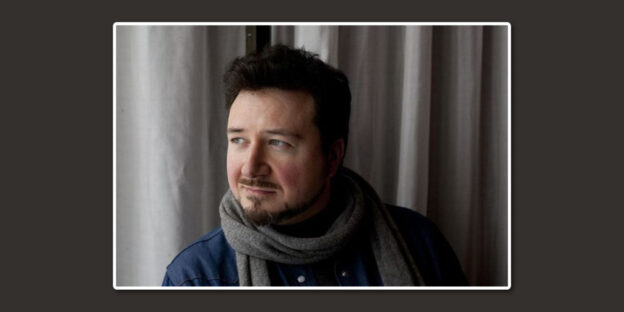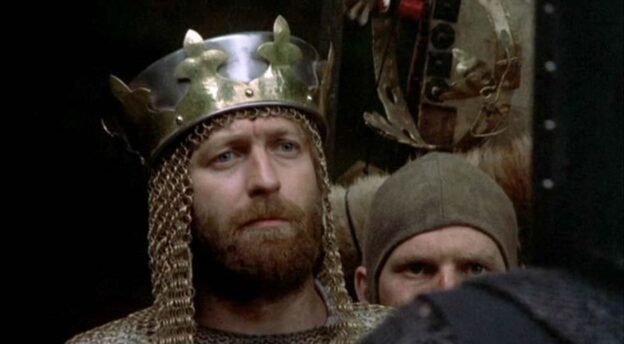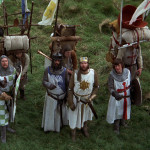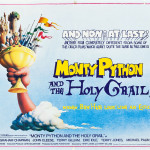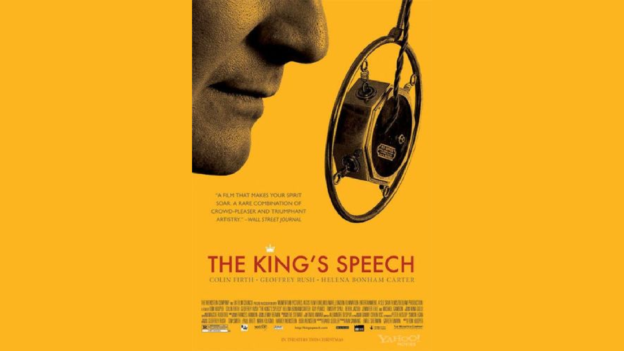This episode is all about Doctor Who. There are some announcements at the beginning of the episode, then an interview with an expert on Dr Who.
The interview begins at approximately 10.00 minutes into the episode.
 Right-click here to download this episode.
Right-click here to download this episode.
Transcript available below. Luke’s English Podcast is a free service for people who are learning English as a foreign language. Luke is a well qualified teacher of English with over 12 years’ experience in Japan, the UK and France. He speaks British English, and teaches at a language school in London, and now at a university in Paris. You can use this podcast to get exposure to native speakers using natural English. Learn phrasal verbs, idioms, useful expressions, linkers, etc. Find Luke on Facebook (search for Luke’s English Podcast) or Twitter (@EnglishPodcast). Cheers!
Some good advice for iPhone users (courtesy of a helpful listener from Russia, called Nikita Kolganov): Copy and paste the tapescript from a podcast into the ‘lyrics’ section of each podcast on your iPhone. To do this, first copy the text from this webpage. Then go into iTunes and ‘right click’ the podcast episode there. Then choose ‘Get Info’, then select ‘Lyrics’. You can add the transcript into the text box there, and then read while you listen to the podcast. Thanks Nick!
Here’s the tapescript for the interview with Lee, about Dr Who:
Luke: Right, if you imagine somebody who’s never heard of Dr Who before, right, how can you explain who he really is. So, so, if, what are the most important things that you should know about Dr Who if you’ve never heard of him before, basically.
Lee: Well, Dr Who is, err, a TV show that it’s main character, a character called The Doctor, who is in fact an alien, has a machine that can travel through time and space, which means that he is able to go anywhere in any planet, any point in the future, the past, whenever.
Luke: Erm, what’s the name of that machine?
Lee: It’s called The Tardis.
Luke : And can you just describe The Tardis? That’s like his spaceship, yeah? Can you describe The Tardis for us? Because in Britain here, everybody knows The Tardis, like, almost everybody knows it. It’s very familiar to us. It’s almost like an icon of British culture. But what is The Tardis? What does it look like?
Lee: Well, The Tardis looks like a 1960s police box, and in the days before mobile telephones and actually people having telephones in their houses, these blue police boxes were like an old phone box, and they also had a double function in that if a criminal caught a policeman [if a policeman caught a criminal] they would be locked up inside this police box, and they also had a phone, so they were a very common object in 1960s Britain, early 1960s Britain when Dr Who started.
Luke: So, it looks a bit like a red telephone box, but it’s blue, and it’s something the police use to make telephone calls. And they could use it to keep criminals in. They could lock a criminal in there if they needed to.
Lee: Exactly. It was a very everyday object which everybody would have known.
Luke: Ok, so everybody knows about what a police box is so…
Lee: But of course it’s not really just a police box because it’s actually bigger on the inside than on the outside.
Luke: Ok, so Dr Who’s spaceship is in the shape of a police box. It’s called The Tardis but it’s actually bigger on the inside than it is on the outside. Ok, right, fine. Um, actually, people these days often use the word Tardis to mean something that’s bigger on the inside than on the outside. Can you give me an example of how we might use the word Tardis to mean something else?
Lee: Well actually there’s quite a famous example when Tony Blair was Prime Minister, in one of the last interviews he did before he left the post, I think it was with The Guardian, the interviewer asked him what was 10 Downing Street like…
Luke: That’s the Prime Minister’s house.
Lee: And he said, oh it’s like The Tardis, and he didn’t need to say anything else but everybody would know that he means it looks smaller on the outside but it’s much bigger on the inside.
Luke: Right, ok. I’ve heard people say that, like, a woman’s handbag is like The Tardis, sometimes, because it looks like a small handbag, but you can actually keep lots and lots of things inside it…
Lee: And such is the power of the programme that even if you’ve never seen Dr Who in this country, you will know if somebody says “It’s like a Tardis”, you will know that it’s bigger on the inside than the outside.
Luke: Right, ok, so that’s what Tardis means to everybody now. OK, what are the other important things that we need to know about Dr Who?
Lee: Erm, well, we need to know the fact that the programme started in 1963, and that means that you get a very good representation of how British society evolved in a kind of televisual way. A record of the times, our changing attitudes to race, to women’s lib, to even things like joining of the common market in the early 70s…
Luke: What do you mean by women’s lib?
Lee: Well The Doctor, traditionally is always accompanied by a female companion, and this was specifically because the programme’s original remit was to entertain a family audience on Saturday afternoon.
Luke: It’s a family show
Lee: Yeah, it’s very much a family show. One that was designed to catch the fathers who’d been watching an afternoon of sport on a saturday, with family who watched, like a pop music programme… it was designed to keep everybody watching, and of course it was hugely successful when it started so it achieved its aim.
Luke: Ok. So, ok, so basically err, he always has a female companion. I think that Dr Who has also had, like, a robot companion as well, right?
Lee: He has, he has, and err, he had a robot companion in the late 70s but he actually… people have thought that it was because Star Wars came out, and C3PO and R2-D2 but actually Dr Who was a year before Star Wars, so…
Luke: Really? So before… everybody knows about Star Wars, they know about R2-D2 and C3P0, but Dr Who before Star Wars had K9. K9 was like a robot dog! (laughs)
Lee: Of course the most important thing to remember is that when the show first started in 1963, the guy who was playing The Doctor was a very old guy, and after 3 years playing the role, it became very obvious that he was ill and he couldn’t do it, and they were like “what are we going to do?”. So, they devised… because we didn’t know who this character was, or where he came from, in 1966 they changed the actor, but made it a part of his personality, and that allows… has allowed the programme to continue to this day nearly 50 years later.
Luke: OK, so this is another important thing about Dr Who, is that you have to know that… How many actors have played him now, actually?
Lee: Erm, well we’re now on number 10 and number 11 starts filming next month.
Luke: OK, erm, the interesting thing about Dr Who is that when Dr Who dies, he doesn’t die. He doesn’t die, instead he changes into a new form, so he becomes a new person, but it’s still Dr Who but he becomes a new person, and it’s like a really important event when Dr Who. It’s… to be honest it’s a way for them to change the actor, right? But in the show, Dr Who… one Dr Who dies and he changes into a new Dr Who, and it’s always like a really big event for the show, right? Erm, so it’s really just a way for them to continue the show. It’s a bit like James Bond in that sense.
Lee: Hmm, but I think it’s more believable than James Bond because its not supposed to be exactly the same character. So each Doctor, well each actor has been allowed to have his own, his own way of playing the part.
Luke: So, his own personality. So every time it’s like a new, different kind of Doctor with a different personality.
Lee: Even though it’s the same, we know it’s the same character behind it, but it’s like a new person to get used to and that keeps the show fresh and it’s kept it going all this time.
Luke: OK, so there have been 10 Doctors, and the 11th Doctor is coming very soon. Who do you think is the nation’s favourite Dr Who so far?
Lee: Well, for many years, everybody would have said immediately, Tom Baker, an actor who played the part from 1974 to 1981.
Luke: Tom Baker actually, err, the Tom Baker Dr Who is probably the most famous one until the most recent one. And he’s famous for having a long scarf, and he was in The Simpsons. He was in the American comedy show The Simpsons.
Lee: He was also in Family Guy …
Luke: He’s in Family Guy as well
Lee: Until Dr Who, because Dr Who was off the air, it stopped being made in 1989 until 2005 when it came back. And until 2005, everybody would have said Tom Baker was the Doctor, but as you’ve said in 2006 the current Doctor David Tenant has taken the programme to new heights of success that it never ever had in it’s original format.
Luke: So Dr Who, even before, erm, the latest Doctor, Dr Who was really really big and really successful, but it’s become even more successful with this new Doctor played by David Tenant, who’s like a great actor, Shakespearian actor
Lee; Yeah, he’s just done Hamlet, and they’re going to be filming Hamlet for television
Luke: It’s a great thing. Because David Tenant is so popular as Dr Who, now he’s playing Hamlet, it’s going to be shown on TV, millions of people in the UK are going to watch Hamlet, which is written by Shakespeare, so it’s a really good way of
Lee: And that kind of fits in with the original, the kind of format of Dr Who in that, because he’s able to go back in the past and meet people like Shakespeare and Agatha Christie, it inspires people to go out and learn more about… you know… the original brief of the show was that it had to go to the future and then the past. So not only would it educate the viewers in a very 1960s BBC way, but it would also entertain, and it would inspire people to go and learn about things
Luke: That’s what the BBC was all about. It was to educate, to entertain and to inform, right? Ok, actually I think I need to clarify just a little bit more about Dr Who just to make sure everybody understands who he is. Dr Who is a Timelord, and that means he’s a kind of alien. He’s not a human, he’s from another planet, but he came to Earth because he, he loves humans, right?
Lee: Yeah, but he doesn’t live on earth, he’s always… just Earth happens to be convenient because that’s where they can film on the cheap
Luke: So, he doesn’t live on earth, but he comes to earth quite a lot
Lee: but he can go anywhere, in time or space. But we have to remember that The Doctor, ok he’s the main character, but what really really made the programme successful and which we cannot not talk about are The Daleks.
Luke: Right, ok, so we’ve talked about, err, Dr Who’s spaceship, his companions, err K9, but another very important thing is to know the enemies that Dr Who has, and you just mentioned The Daleks, right? So who are Dr Who’s enemies? There’s probably, like, three maybe four most popular, most famous enemies
Lee: Well, The Daleks are, if you, again it’s like the word Tardis, if you say to somebody who’s never seen Dr Who in their life, they’ll know, if you say Dalek, they will know what you mean and may even do an impression of one by talking like this
Luke: Exterminate! Exterminate!
Lee: Exactly! Exterminate. So, I mean, Dr Who’s first story in 1963 was a bit of a dull… and it was set in caveman times. It’s very much introducing the characters. It was four weeks later, the introduction of these things called The Daleks, which just literally took the public imagination by storm. You can’t work out why. If you see them they look like a pepper-pot walking around. Maybe it’s the voice. There’s been lots of theories of why people just, why they’re so important to people, but whether they’re reseblent [reminiscent] of Nazis, because you remember the war had finished just 20 years before, you know. There’s just something about a Dalek, and again it’s just a proper cultural icon. So much so that in 1996 there was a survey to find out icons of British culture the public wanted put on stamps, and the first class stamp was The Dalek.
Luke: So there was a survey, and the British public voted The Dalek as the number 1 icon to put on a stamp! That’s even before the Queen, so they didn’t want the Queen’s head, they wanted a Dalek on there. So, just again to clarify a Dalek is like a robot…
Lee: It’s a robot but it’s got a creature inside it controlling it that hates anything … (laughter) …if you see them, it’s like “What is it?”, but there’s something about them. It’s a creature inside that controls them, and this creature wants to kill anything that is not like yourself [itself]. Now, I have to stress, the programme, although it sounds violent again is for a family audience, so y’know, the kids were watching, with their parents and although they were scary, it was a safe kind of fear because you could hide in Mum and Dad’s arms, you know, or hide behind the sofa, which is very much again the tradition of the…
Luke: These are other important things about Dr Who, is that it’s a family show, so so, erm, most people in the UK grew up as children watching Dr Who on a Saturday night. I watched it with my family…
Lee: I watched it with my Mum, my Mum watched it with her Mum, you know…
Luke: Everybody knows it, it’s like something really important about British culture. Erm, one of the things that everybody says about Dr Who is that because it’s quite scary, erm, you end up watching it from behind the sofa. So you can’t just sit in front of the TV and watch it. You have to hide behind the sofa, and sort of like, y’know, look over the top of the sofa to watch it because it’s so scary.
Lee: Now, you see, you’re lucky because when I was a child, our sofa was pushed against the wall. So I had to hide behind a cushion.
Luke: So you couldn’t hide behind the sofa.
Lee: Which is very very scary…
Luke: But that’s another expression, it’s another bit of erm, vocabulary that everybody knows now ‘to hide behind the sofa’, because of Dr Who. OK, so we’ve talked about The Daleks… now another thing about Dr Who is that it’s kind of funny, isn’t it?
Lee: Mmmm, it’s got a very British dry sense of humour, and partly because the programme has never had much money spent on it, so… rather than have lots of special effects you have to have a very good script that’s sharp, that’s funny. The Doctor is a character who never carries a weapon. He uses words, he uses his brains, he uses his intellect to get out of situations, so… and it has an, it it has a kind of humour that’s very British, but also, as you say very funny, you know, so…
Luke: I…
Lee: It doesn’t take itself too seriously
Luke: It’s not a serious show. It’s very much a kind of camp, funny kind of show. And also, one of the…
Lee: …and scary and exciting
Luke: That’s right, it manages to mix, like, comedy and erm, like, satire and fashion or something, and serious science fiction as well. It’s just great. Erm, what was I going to say? Oh yeah, err, one of the funny things about Dr Who is, like, the special effects.
Lee: Mmm, they were. In the old series, which as I said started in 1963, ended in 1989… famously, Dr Who never had any money, which means that there was no money for special effects, but you have to remember, the news series is different. It’s got amazing spe… award winning special effects. But you have to remember that the BBC as an institution in the 1960s and the 1970s was at the cutting edge, was at the front of this new technology, and all the stuff you see with green screen now is because of the stuff the BBC were doing with Dr Who in 1969 when colour television had just been invented, and you see that early experiments in yellow screen it was then, but you know this is why we have these special effects now.
Luke: So Dr Who innovated a lot of special effects.
Lee: Exactly. People like Ridley Scott was one of the designers…
Luke: Ridley Scott is now a famous director who’s directed films like Gladiator, but, and Ridley Scott worked on Doctor Who in the 60s. But I remember when I was younger when I watched Doctor Who on TV in the 80s, the special effects were quite funny because usually the monster was, a kind of man in a suit. It was basically a man in a suit. You know? In a bit… in a similar way to, in Japan, the way Godzilla was so popular. Godzilla when you watch the original movie, it’s obviously a man in a rubber suit.
Lee: Well I think the thing about 80s Doctor Who is, it’s very 80s. You know, 70s Doctor Who, 60s Doctor Who is, and to a certain extent it’s all very scary but there’s something about 80s Doctor Who which just looks over lit, the colours are really garish, and it’s just very 80s. Very much a product of its time. And maybe in a way that 60s and 70s Doctor Who was very much ahead of its time.
Luke: Ok, so Now though, Dr Who is very popular, more popular than it was before.
Lee: More popular than it’s ever been before. It’s the top rated drama on the BBC, it gets the highest ratings for a drama. The audience appreciation figures, which are a rating of how much the audience actually enjoys it are always in the lower 90% which for a drama which is very popular which is unheard of, umm. It’s always in the press because remember the newspapers have a 50 year history to draw back on and public interest in Dr Who at the moment has never ever been higher and now with David Tenant, the most, arguably the most popular Doctor ever, about to change at Christmas and New Year, then the future once again looks…
Luke: Great. So basically, umm, the important thing about Dr Who, if you’re a learner of English right, is it important to know about Dr Who? Why is it important for learners of English to know about something like Dr Who?
Lee: I wouldn’t say it was important but I would say it offers a very good insight into British culture, the British view of things, the British sense of humour, and also it’s just a great way to pass 50 minutes just lapping up British culture.
Luke: It’s just a great show, it’s very fun, very entertaining.
Lee: It’s very easy to watch. You don’t have to know everything about it. Each week there’s somewhere new, you know, so
Luke: It’s one of those things I guess, that … if a learner of English listens to two English people, often they don’t understand it because often the English people will talk about things that the learner of English doesn’t understand, and one of those things might be Dr Who. It’s kind of something that everybody knows about, something that people talk about quite a lot. For example, like, mentioning the Tardis or The Daleks
Lee: I think there was a great interview with, erm, when the Queen’s golden jubilee about 5 years ago, 6 years ??. there’s an interview with Prince Andrew and he said he had really happy memories of watching Dr Who with his Mum and Dad in the early 70s.
Luke: So even the royal family watch Dr Who
Lee: David Beckham gets the box sets for Christmas, delivered to his house. Everybody watches it.
Luke: OK, so there you go. Everybody is a fan of Dr Who. Is it possible to watch Dr Who in other countries?
Lee: Yes, it’s the BBC’s biggest export in terms of where it’s sold to, and it’s currently available in 42 different countries, you know. It has a regular audience of 165,000,000 viewers, so… everywhere from Saudi Arabia… it’s the number 1 export show in South Korea, so…
Luke: Really? So, a lot of South Korean people…
Lee: It even beats CSI
Luke: Even more popular than CSI? …in South Korea. So if you’re from South Korea and you’re listening to this, then send me a message if you’ve seen Dr Who, tell me what you think of it. Now, I think that they did show Dr Who in Japan, but I heard that nobody understood it at all. They didn’t get it, and erm, I think…
Lee: But they did, to be fair, they did show this back in the 1980s when they showed the last 3 years of the show and, quite frankly, unless you were a fan of Dr Who it probably would have been the weirdest thing that definitely may even have got a cult audience, but not a…
Luke: I think the late 80s Dr Who was probably the worst Dr Who. It’s terrible, right?
Lee: That’s a bone of argument I have to say
Luke: For me, after Peter Davidson, it wasn’t very interesting. I didn’t like it myself. I stopped watching it at that point.
Lee: Anyway, shall we end on a positive note?
Luke: Yeah. Umm, ahh, just a thing about in Japan. They even changed the name of Dr Who, they put it into katakana, that’s Japanese characters. And in Japan everybody knows Dr Who as Do-ku-ta-fhooo. Dokuta-fhuuu, which is kind of funny. Ok, so, right, are you looking forward to the new Doctor?
Lee: Yes, again, you know, the, having been a fan of Dr Who since I was 5 years old, errm… I’m still very young… ermm, I errr,… I love it when he changes. It’s so exciting, you never know what’s going to happen
Luke: Do you think this new guy is going to be a good Doctor?
Lee: I’m sure… because, they guy who’s now in charge of the show is one of the best writers of the last couple of years, so I’m sure it’s in very safe hands, and you know, I think it’s going to be great.
Luke: OK, great, so, erm… If you’re interested in Dr Who you can buy the box set, the DVDs on Amazon. You could probably watch some Dr Who clips on YouTube
Lee: Yeah, for real…
Luke: Erm, if you’re interested, you can watch it. But otherwise, just umm, errr I don’t know what I’m going to say now! I hope you enjoyed that conversation anyway. Thank you very much Lee.
Lee: Bye, thank you
Luke: Oh oh, one more thing. Why do you know so much about Dr Who?
Lee: As I said, because I’ve loved it since I was 5 years old, and erm, for me it’s just, I don’t know, I have a really strong emotional attachment to Dr Who, you know, he was always there… because he was such a constant character in my childhood and even in my adulthood.
Luke: You’re also an expert, aren’t you, on Dr Who
Lee: Yeah, but I have my limits… My house is not full of toy daleks of every description
Luke: Just a few… because you’re not a total geek or anything
Lee: No, I’m not. I haven’t got Dalek pajamas or… which are available!
Luke: If you’re wondering what to buy Lee for his birthday or Christmas
Lee: Dalek underpants or pajamas please
Luke: Dalek underpants or pajamas. I think they’re available on the internet
Lee: Marks and Spencer!
Luke: or Marks and Spencer, do they do them? Right, well I think on that note, err, I’ll end the conversation. Thanks very much Lee.
Lee: Thank you very much
Luke: OK
-

-
All the Doctors so far
-

-
Me in The Tardis
-

-
Lee and a Dalek
An interview with Matt Smith, the 11th Doctor:
[youtube=http://www.youtube.com/watch?v=Zog-6SrGxE0&hl=en_US&fs=1&color1=0x234900&color2=0x4e9e00]
Language Analysis
The following language analysis was written by Richard Gallen, a fellow teacher at The London School of English. Richard has written analysis of part of the interview between me and Lee. Use this in order to get a detailed understanding of some of the useful language used in the interview. If you a teacher, you may be interested in using this language analysis as a way of adapting the podcast for teaching in the classroom. Thanks to Richard Gallen.
Lee and Luke explain Doctor Who – language for explaining and describing
Luke: Right, if you imagine somebody who’s never heard of Dr Who before, right, how can you explain who he really is. So, so, if, what are the most important things that you should know about Dr Who if you’ve never heard of him before, basically.
Lee: Well, Dr Who is, err, a TV show that it’s main character, a character called The Doctor, who is in fact an alien, has a machine that can travel through time and space, which means that he is able to go anywhere in any planet, any point in the future, the past, whenever.
Luke: Erm, what’s the name of that machine?
Lee: It’s called The Tardis.
Luke : And can you just describe The Tardis? That’s like his spaceship, yeah? Can you describe The Tardis for us? Because in Britain here, everybody knows The Tardis, like, almost everybody knows it. It’s very familiar to us. It’s almost like an icon of British culture. But what is The Tardis? What does it look like?
Lee: Well, The Tardis looks like a 1960s police box, and in the days before mobile telephones and actually people having telephones in their houses, these blue police boxes were like an old phone box, and they also had a double function in that if a criminal caught a policeman [if a policeman caught a criminal] they would be locked up inside this police box, and they also had a phone, so they were a very common object in 1960s Britain, early 1960s Britain when Dr Who started.
Extra information clauses
Describing a film or book can be a little difficult. It’s quite hard to keep people interested. That’s why when we introduce a character we sometimes say something interesting or exciting about them
a character called The Doctor, who is in fact an alien
..then there’s Princess Leia who is fact Luke’s sister
In 1988 she met this man called Greenlee, who was in fact the top CIA agent in Bolivia at the time.
In the examples above ‘who’ refers to the noun before it (The Doctor/Princess Leia/ this man called Greenlee). In the example below ‘which means that’ doen’t only refer to the noun before, it refers to the whole clause before:
It’s a machine that can travel through time and space, which means that he is able to go anywhere in any planet, any point in the future, the past, whenever
The most common verb after ‘which’ in extra information clauses is ‘means’ .It often says something about the result of an event
I slept through my alarm clock which meant that I had to run like crazy for the train
Gilardino scored a goal very late in the match which meant that Italy qualified for the 2010 World Cup in South Africa.
In that..
When Lee was describing police boxes in England he said:
they had a double function in that if a policeman caught a criminal they would be locked up inside this police box
we use ‘in that’ when we think we could be more precise about something we’ve just said : ‘in that’+example
He was quite reserved in many ways but he was also very sociable in that he liked entertaining,
It’s already old news (in that it was announced 6 hours ago…) but President Obama has been awarded the Nobel peace prize
The most common adjectives that come just before ‘in that’ are:
unique / unlucky / unusual/ fortunate
UNICEF is unique in that they are in countries, before, during and after emergency situations and humanitarian crises
Gordon Brown was unlucky, in that he became PM when we were on the edge of a disaster
She was fortunate, in that she had so much money she didn’t need to work
Like
‘Like’ is very common when we describe:
And can you just describe The TARDIS? That’s like his spaceship, yeah?
Luke is trying to explain what the TARDIS is…. But he can’t find exactly the right words. This is very common in conversation and when we describe things because it’s difficult to be precise all the time
As the examples below show, sometimes we are imprecise because we want to exaggerate. ‘Like’ is very common to introduce an exaggeration:
It’s [almost] like….. an icon of British culture
Because in Britain here, everybody knows The TARDIS, like, almost everybody knows it
Some other examples:
..and it was so good, it was like, one the best meals I ever had.
..and for a few months he was like, crazy about me, he was calling me and sending me flowers
Notice how we pause just after ‘like’ when we use it in this way
Other uses of ‘like’
We use ‘like’ in questions to ask for a description:
But what is The TARDIS? What does it look like?
‘Like’ also means similar to:
These blue police boxes were like an old phone box
When ‘like’ means ‘similar to’ we use adverbs to make the comparison softer or stronger
a bit like /rather like / (to soften)
just like /exactly / a lot like (to strengthen)
Horse surfing is a lot like surfing, just with horses
The currents in the sea were really strong and, for a minute, it is was almost like a huge monster was sucking me under
The following ‘sense’ verbs are common before ‘like’ when we use it in this way.
feel/ taste/ sound/ look/ smell
It felt like I had been waiting for hours but it was in fact only 20 minutes
He smelt like he hadn’t had a shower for weeks
She looks like she’s been crying
![]() This is one of those episodes in which I invite a friend onto the podcast and we chat about various things. I like these episodes because it gives me a chance to get to know someone on the podcast, and you can listen to some natural free-flowing conversation in English.
This is one of those episodes in which I invite a friend onto the podcast and we chat about various things. I like these episodes because it gives me a chance to get to know someone on the podcast, and you can listen to some natural free-flowing conversation in English.